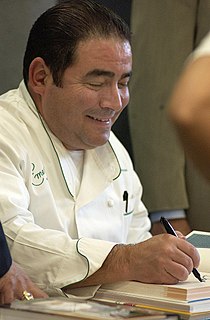A Quote by Cat Cora
I use a lot of fresh citrus, garlic, and fresh herbs when cooking to cut down on fat and sodium but punch up flavor. Our cupboards and fridge are full of condiments - mustards, vinegars, etc. that also add tons of flavor but are low in fat, calories, or other processed additives.
Related Quotes
Seven Guidelines For a Healthy Diet
1. Substitute low-fat foods for high-fat foods
2. Cut down on meat-eat low on the food chain
3. Avoid salty and sugary foods
4. Cut down on sugar
5. Emphasize whole grains
6. Beware of alcohol
7. Emphasize the Healthy Five:
Raw unsalted nuts and sesame seeds
Sprouted seeds such as soybeans
Fresh raw wheat bran and wheat germ
Yogurt and kefir
Fresh fruits and vegetables
At the end of the day, yes. It's all about the marbling and maybe a few other things along the way. But intramuscular fat, that's where you get a lot of flavor. Fat carries the flavor but in the last 50 years it's been bred out of pigs. When American chicken exploded in the 70's and became such a huge commodity, it took away pork sales. The pork industry suffered and had to change.





































